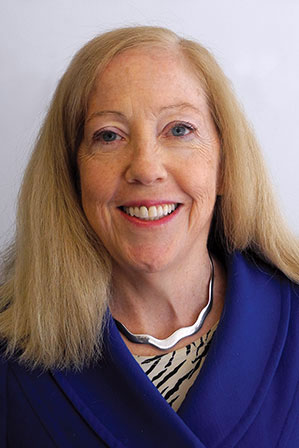Another Kind of Stewardship
Where We Stand
BY JULIE NUTTER

The upcoming January-February issue of The Foreign Service Journal will be filled with success stories of how the Foreign Service promotes U.S. prosperity through economic and commercial diplomacy.
The stories will focus on how the Foreign Service helps to boost U.S. jobs, ramp up U.S. exports and expand U.S. global business activity. They come from many different embassies and various agencies, and they all highlight a common mission: to promote American interests around the world, specifically U.S. economic and commercial interests, as well as broader interests like spreading the rule of law, nurturing economic growth and growing fair and transparent business environments.
To lay the groundwork for that double issue, several authors have contributed perspectives in recent issues of the Journal. One of these is Dan Crocker, AFSA’s Foreign Commercial Service vice president. In his November column, Dan discussed the importance of economic and commercial sections pulling together for results. He also gave a great explanation of how they differ.
This is a crucial point. Economic and commercial officers have different approaches—commercial work is usually clientcentered and case-specific, while economic work tends to be longer-term and policy-focused. When these approaches are combined, he points out, the results can’t be beat.
Solving a specific problem while improving the system changes the conditions that created the problem in the first place, ensuring that diplomats who come after will not have to solve the same problem again. That sounds like stewardship!
Taking this approach seems to be common sense, but is less common than one would think. Policy change— playing the long game— feels plodding and difficult. Sustaining commitment and focus for long-term change requires incredible perseverance. Luckily, quick wins give us the burst of energy we need to stay the course—to be stewards, leveling the playing field for those who will play long after we are gone.
Sustaining commitment and focus for long-term change requires incredible perseverance.
Let’s say an embassy gets a complaint from a company or group of companies about rampant piracy of intellectual property in the host country. The embassy decides to do an all-out blitz to solve the specific problem. They approach host-country companies that are also getting ripped off, companies that have the same concerns and want new laws and better enforcement. The American and local business leaders draft legislation that would help eliminate the problem and contribute suggestions for tighter enforcement.
Embassy officials then go to the foreign ministry and to the prime minister’s office, to get political party buy-in. They sell the legislative package to the leaders in the coalition government with the ministries’ support. The legislation passes, and new enforcement techniques are created. The police put additional people on the beat to monitor pirating, closing illegal copying facilities and street vendors. Judges start to hand down heavy punishments for violations.
The foregoing is not fiction. It really happened, and it’s one of the stories you’ll read about in the upcoming “Economic Diplomacy Works” issue. By pulling the resources of the embassy together to meet a goal, by taking care of the short term by also looking at the long term, the Foreign Service left the business environment in this country more welcoming for others in the future.
When we demand fair competition, transparency and accountability in business environments, American brands can triumph. We should not be shy about demanding these conditions, and we should try to create them if they are not there.
The Foreign Corrupt Practices Act, created in 1977, was barely enforced—even in the United States—until decades after it was passed into law. Once enforcement got serious, our companies were at a distinct disadvantage overseas. They had to conform to strict bribery prohibitions that foreign companies did not face. So what did we do? We exported the idea and campaigned in other countries for their adoption of similar legislation. The campaign worked.
There are now many versions of the FCPA in partner countries. These laws have made overseas environments more hospitable for U.S. companies, but they have also laid out the welcome mat for all who want to conduct business in an above-board manner. What we accomplished with the FCPA was stewardship on a global scale.
In these times when our public servants, including the Foreign Service, are facing skepticism regarding the value we provide to our fellow citizens, we can stand strong in the knowledge that practicing stewardship—taking care of the short term by also looking at the long term—creates lasting value for everyone.

